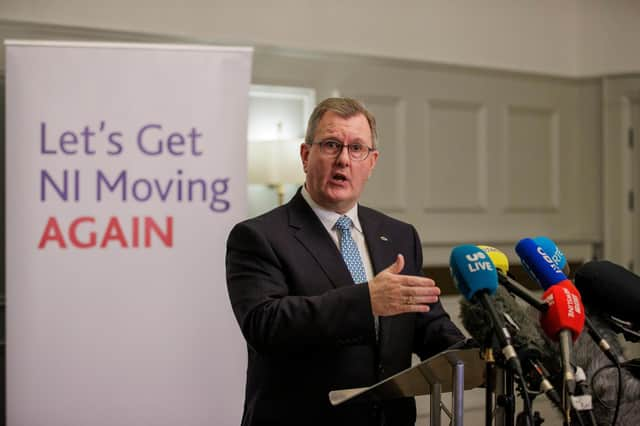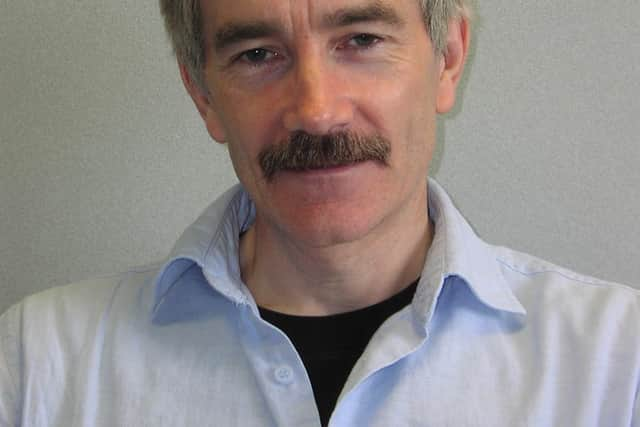Arthur Aughey: Proclaiming equal citizenship may be magnificent but it’s vacuous


This deal is harder than most to accept. Sometimes there are no good options. That’s political reality. Leadership involves facing the challenge squarely. Donaldson faced it and acted pragmatically.
Having done so, he shouldn’t oversell. Acting pragmatically means adapting principle to circumstance. It will be challenged as betrayal. Equal citizenship, it’s claimed, is the principle betrayed. But purity of principle should not empty minds of the art of the possible. We’ve been here before.
Advertisement
Hide AdAdvertisement
Hide AdYes, politics lives on imaginative phrases. Some are powerful because they capture the self-understanding of people, give their deepest instincts expression and take on almost mystical authority.


Equal citizenship of the 1912 Ulster Covenant, defining unionists’ cherished position within the United Kingdom, was one such phrase, summing up and justifying a political movement. However defining, unionists later settled for home rule in Northern Ireland. For some this real security was a badge of exclusion.
Equal citizenship revived in 1985 with the signing of the Anglo-Irish Agreement. As Peter Robinson put it, Northern Ireland had been placed on the window-ledge of the Union (or so it seemed). The shock of the Agreement alarmed unionists across their divisions (if unionism is a ‘family’ it has always been a fractious one) to return to basics. Equal citizenship became the rallying cry.
As a slogan it had simplicity and progressive credentials, liberal enough to challenge the prejudice that unionist politics were entirely reactionary. Who would deny equality? Who would gainsay citizenship? These were woke words, civil rights words, and had an edge of radicalism.
Advertisement
Hide AdAdvertisement
Hide AdUnfortunately, as Edmund Burke observed against the French Revolution, their abstract perfection is their practical defect. After 1985, equal citizenship, a uniform and unqualified principle, encountered British history, the realities of party politics and the limits of unionist persuasion. Its defects became obvious. Kant’s dove comes to mind: ‘The light dove in free flight, cutting through the resistance of air, could imagine doing even better in airless space’.
Equal citizenship was the idea of free flight from the Anglo-Irish Agreement into an unavailable UK unity. It struggled in airless space and fell impotently. Instead, unionist parties chose to seek ‘an alternative to and a replacement of’ the Anglo-Irish Agreement, a first step towards the Agreement of 1998, envisaged then by no one.
Equal citizenship was always a response to the argument ‘Northern Ireland is different’. It challenged the implicit logic flowing from that argument: the differences made Northern Ireland un-British and it should take its differences out of the UK and into a united Ireland. In truth, Northern Ireland (to misquote Mrs Thatcher) wasn’t as British as Finchley. Equally, Glasgow wasn’t as British as Finchley, nor was Cardiff. In the UK today, differences are more obvious than they were in 1985. It’s called devolution.
Equal citizenship, now the language of the Centre for the Union, is a rallying cry once more, this time against the protocol/Windsor Framework. The question it addresses is familiar. The centre argues that the Protocol will enhance Northern Ireland’s differences from the rest of the UK, foster an all-island economy and ultimately bring Irish unity. The Centre has been consistent and energetic on this point and not without substance. The EU’s high legalism, egged on by Dublin, is a poor fit for Northern Ireland’s low politics. Consistency and energy aren’t enough, however, and not necessarily wise. Like Kant’s dove, it is sensible to acknowledge resistant circumstances and practical limits.
Advertisement
Hide AdAdvertisement
Hide AdLee Reynolds wrote recently that unionism requires adaptability. It cannot simply ‘repeat’. That’s especially so when the temptation is to repeat the same old mistakes. Self-interest requires adapting abstract principle to changed circumstances. In 1985, equal citizenship as resistance helped enthuse a political generation, persuading those who were pro-Union to embrace with confidence unionist politics. Today it is having the opposite effect. To deploy it as an echo of never, never, never, as the Centre does, does not reflect of the centre of gravity of pro-Union opinion, unlike 1985. It divides rather than unites.
Moreover, it squanders an enormous opportunity. Opinion polls show the project of Irish unity is going nowhere ‘despite Brexit’. The Republic of Ireland is fundamentally unserious about either unity or about Northern Ireland and the majority here remain opposed. The SNP isn’t going to deliver break-up of the Union any time soon as nationalist commentators predicted. Therefore, proclaiming equal citizenship may be magnificent but it’s vacuous. It would leave local politics in frustrating impotence between two impossibilities: Brexit one and indivisible and Irish unity one and indivisible. Equal citizenship shouldn’t become (ironically) the mantra of local nationalism, diminishing the appeal of the Union, not expanding it.
Arthur Aughey is Emeritus Professor of Politics, Ulster University